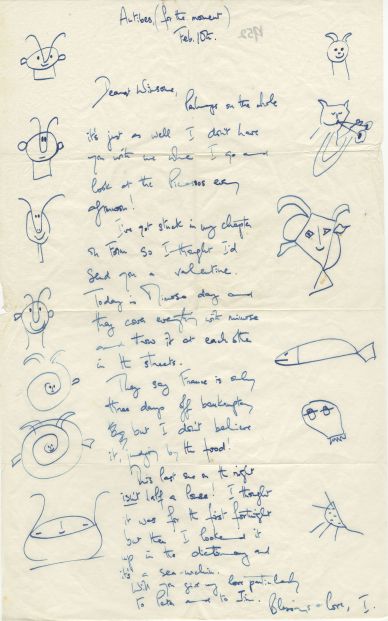Imogen’s series of published and manuscript music of other composers, gifted to, used, edited, and kept by her, reflects a wide variety of characters, music, and movements in the arts world of the time. From English to German, Italian to Franco-Flemish, Dutch to Australian, Imogen collected the works of composers from around the world, as well as those throughout history, with her selection revealing music from deep within the Tudor period, and the Renaissance, right through to her contemporaries of the twentieth century
The relevance of female composers and collectors from all walks of life must not be overlooked, and while still overshadowed by the number and prestige of male composers, I hope to give an insight here into the nature of music and characters to whom Imogen looked, and indeed listened; those who are reflected in the collection, and in turn, reflect Imogen’s own varying interests.

HOL/2/8/1/1/2 Letter from Imogen Holst to Winsome Bartlett, another female composer, close friend and colleague, 10 Feb 1952 [Copyright: Holst Foundation]
Although few of Boyle’s works were played or published in her lifetime, she was the only woman to be honoured by the prestigious Carnegie United Kingdom Trust, for her orchestral rhapsody The Magic Harp. Her musical network was also far from modest, spending a period of her life studying under Ralph Vaughan Williams, who was a champion of her work and encouraged her to have it published. However, Boyle lived most of her life isolated from the centre of the musical world, the outbreak of the Second World War dragging her away from London to act as carer for her parents at their family home in Eniskerry, Ireland.
Jane Joseph- (1894-1929)
Joseph started composing as a pupil at St Paul’s Girls’ School and won acclaim and prizes for both compositions and performances. She was also a favourite of Imogen’s father Gustav Holst, chosen to act as his amanuensis during his composition of The Planets, and as his librettist for The Golden Goose. Joseph, in her short lifetime, was also a prominent member of the Society of Women Musicians, which encouraged cooperation and communication among female composers and musicians at a time of limited opportunity. Many of the other names in Imogen’s collection also appear on the list of members, including Elizabeth Maconchy, and Imogen Holst herself, who acted as Vice-President for a period.
Mabel and Nathalie Dolmetsch
The many members of the Dolmetsch family were significant figures in the revival of interest in early music and instruments, particularly Mabel’s husband and Nathalie’s father, Arnold Dolmetsch. However, the contributions of the female members of the family were not insignificant to this revival either. Mabel, a talent in early and modern languages, worked on translations of many fifteenth and sixteenth century treatises on early dance, while Nathalie herself was a leading member of the Viol da Gamba society, also writing successful books on her interests.
Maud Karpeles (1995-1976)
An avid folk-song collector and teacher of dance, Karpeles founded a successful folk dance club in Canning Town, which later became the heart of the English Folk Dance Society (founded 1911), with whom Imogen had much involvement. Companion to Cecil Sharp, an unmistakably important name in the revival of folk music in the twentieth century, Karpeles actively collected within isolated communities, including in the Appalachians. Often only able to reach villages and towns by mule, her commitment and dedication to bringing folk music to the masses is evident.
Dame Elizabeth Maconchy (1907-1994)
Known to Imogen as ‘Betty’, Elizabeth Maconchy was the first woman to chair the Composer’s Guild of Great Britain and also later became the President of the Society of the Promotion of New Music, succeeding Benjamin Britten in the role.
Thea Musgrave (1928-present)
Musgrave is known for her pioneering operas and dramatic concerti, including the Clarinet Concerto of 1968 in which the soloist engages with different sections of the orchestra at different times by moving around the stage. Her opera, Harriet: A Woman Called Moses tells the story of an African-American slave who, after escaping herself, returned to the south to help over 300 other slaves escape to the north via the Underground Railroad. Also acclaimed for her use of electronically generated sound, Thea Musgrave, most often describes her music as “dramatic-abstract”.

HOL/2/8/1/1/3 Letter from Imogen Holst to Winsome Bartlett, 28 Mar 1952 [Copyright: Holst Foundation]
Hannah, Project Archivist



Sincere thanks for sharing this information! Shall pass it on the Archives of Women and Music in Frankfurt, Germany and to the Frauenorchesterprojekt, Berlin.
LikeLike